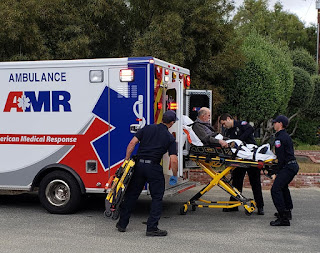Thanks for checking in and following my ongoing Myeloma cancer blog, which I began June 2010, to document my "summer vacation" at City of Hope Hospital for my Autologous Stem Cell Transplant. I hope you enjoy my candid musings and treatment status updates. Please comment so I know you've stopped by! Look for my 2021 status updates on the 1's, but I'll surprise you and post in-between :)) Thanks for reading, caring and commenting!

Cowgirl Up!!! ... Does Horse Poop Cause Cancer??
Friday, April 19, 2019
Meltdown 101
Hello world...
This week was total MELTDOWN week for me... Total Emotional Meltdown :((
So much to tell, share, let go of... but I am too beat up, too exhausted...
So here's the headlines:
Had to call 911 for my hubby on Tuesday, as "he fell and couldn't get up"...
He was taken to ER, fortunately ok, nothing broken, fractured
On top of that, he's really declining each day
New challenges for him, me, our family every day
Never ever expected any of this sadness and illness chaos
So much physical and psychological challenge every day...
So much body betrayal on all levels
Had my monthly Dr appt on Monday, with lousy news:
IGA up 200 points, @ 1440 ...(normal = 70-400)
Last month's "no M Protein" was a misread or fluke
M Protein is actually up, at 1.19 ...(normal = zero)
Beta2Microglobulin is 2.3 ...(normal = 1 - 1.8)
Light Chains = low or normal
New changes:
My Dr and I discussed increasing my Velcade and Cytoxan dose
If you've been reading my blog for a long time, you know my response to that... NOPE!
One change, one increase at a time for me
Less is more
Let's see if one increase works
Let's see which increase causes which side effects, rather than increase both, and not know what side effects are happening from what
So I agreed to increase the Velcade dose
Received 2 lovely injections on Monday
Had nausea later the next 2 days
Ok now, better
Hopefully this increase will pound myeloma's ego back a bit
............
I had a complete emotional meltdown this week... not about me
I'm learning to reach out and ask for help
It's ok to ask for help, it's ok to not be strong
I call medical professionals more now, than I ever did with my cancer situation
I cry, yell, sob, scream, talk to myself, talk to the Universe, and experience the spectrum of intense emotions more with my husband's situation, than I ever did with my myeloma diagnosis, treatments.
I am just completely overwhelmed and devastated on so many levels.
Of course my treatments and side effects complicate it all, but watching him decline and see Alzheimer's completely steal who he is, how he is, what and who he used to be able to do... is just so incredibly tragic, awful to see and live, day in and day out...
I'm sooooooooo beat up...
I will write more next time... I hope.
Thank you for reading and caring, and checking in!
Helpful Myeloma Links
- American Cancer Society- Multiple Myeloma
- American Society of Hematology
- Amgen
- Ask Dr Durie
- Cancer Therapy Advisor - MM
- Chemo Care- Drug definitions
- Cytoxan
- Darzalex
- Dexamethasone Steroids
- Health Monitor Magazine
- International Myeloma Foundation
- Kyprolis
- LLS- Myeloma
- MM resources
- Multiple Myeloma Research Foundation
- Myeloma Beacon
- Myeloma Blogs
- Myeloma Central
- Myeloma Crowd
- Myeloma Symptoms
- OncLive
- Patient Power
- Pomalyst
- Revlimid
- Support Groups
- Understanding Multiple Myeloma
- Velcade
My Story... How my MM was diagnosed
My treatment trail ride forks to City of Hope hospital as I will saddle up beginning June 9, 2010 for a new rodeo called an Autologous Stem Cell Transplant!
Chemical Warfare...
My initial chemo regimen:
Pill form Chemo= Revlimid (10mg, 15mg capsules)
Allopurinol- keeping the kidneys healthy
Acyclovir- anti-Shingles, anti-viral
June 2010:
High dose IV Cytoxan chemo
Neupogen to build up stem cells for Apheresis, stem cell harvest, which was very successful, as City of Hope was able to collect 9.5 million of my own stem cells
July 2010 Hospitalization:
Two days of high dose Melphalan chemo
Then July 5, 2010 = my Autologous Stem Cell transplant infusion!
And you can read my whole story from that point forward in this blog!
What is multiple myeloma?
What is multiple myeloma?
Cancer starts when cells in the body begin to grow out of control. Cells in nearly any part of the body can become cancer, and can spread to other areas of the body. To learn more about how cancers start and spread, see What Is Cancer?
Multiple myeloma is a cancer formed by malignant plasma cells. Normal plasma cells are found in the bone marrow and are an important part of the immune system.
The immune system is made up of several types of cells that work together to fight infections and other diseases. Lymphocytes (lymph cells) are the main cell type of the immune system. The major types of lymphocytes are T cells and B cells.
When B cells respond to an infection, they mature and change into plasma cells. Plasma cells make the antibodies (also called immunoglobulins) that help the body attack and kill germs. Lymphocytes are in many areas of the body, such as lymph nodes, the bone marrow, the intestines, and the bloodstream. Plasma cells, however, are mainly found in the bone marrow. Bone marrow is the soft tissue inside some hollow bones. In addition to plasma cells, normal bone marrow has cells that make the different normal blood cells.
When plasma cells become cancerous and grow out of control, they can produce a tumor called a plasmacytoma. These tumors generally develop in a bone, but they are also rarely found in other tissues. If someone has only a single plasma cell tumor, the disease is called an isolated (or solitary) plasmacytoma. If someone has more than one plasmacytoma, they have multiple myeloma.
Multiple myeloma is characterized by several features, including:
Low blood counts
In multiple myeloma, the overgrowth of plasma cells in the bone marrow can crowd out normal blood-forming cells, leading to low blood counts. This can cause anemia – a shortage of red blood cells. People with anemia become pale, weak, and fatigued. Multiple myeloma can also cause the level of platelets in the blood to become low (called thrombocytopenia). This can lead to increased bleeding and bruising. Another condition that can develop is leukopenia – a shortage of normal white blood cells. This can lead to problems fighting infections.
Bone and calcium problems
Myeloma cells also interfere with cells that help keep the bones strong. Bones are constantly being remade to keep them strong. Two major kinds of bone cells normally work together to keep bones healthy and strong. The cells that lay down new bone are called osteoblasts. The cells that break down old bone are called osteoclasts. Myeloma cells make a substance that tells the osteoclasts to speed up dissolving the bone. Since the osteoblasts do not get a signal to put down new bone, old bone is broken down without new bone to replace it. This makes the bones weak and they break easily. Fractured bones are a major problem in people with myeloma. This increase in bone break-down can also raise calcium levels in the blood. (Problems caused by high calcium levels are discussed in the section “How is multiple myeloma diagnosed?”)
Infections
Abnormal plasma cells do not protect the body from infections. As mentioned before, normal plasma cells produce antibodies that attack germs. For example, if you developed pneumonia, normal plasma cells would produce antibodies aimed at the specific bacteria that were causing the illness. These antibodies help the body attack and kill the bacteria. In multiple myeloma, the myeloma cells crowd out the normal plasma cells, so that antibodies to fight the infection can’t be made. The antibody made by the myeloma cells does not help fight infections. That’s because the myeloma cells are just many copies of the same plasma cell – all making copies of the same exact (or monoclonal) antibody.
Kidney problems
The antibody made by myeloma cells can harm the kidneys. This can lead to kidney damage and even kidney failure.




So sorry to hear about your husband's decline and trip to the emergency room. Hope you're getting the support you need to cope with the situations you're faced with. Please take the best care you can of yourself, you're important to all your family and friends. Holding you in my thoughts with wishes for the best outcomes possible, Bernadette
ReplyDeleteHi Bernadette, thank you so much for your kind words of support and caring. Yes, thankfully I have a wonderful network of support- real and virtual- (virtual friends like you, and the ladies below too! :)) Also, our Kaiser home health team is just a phone call away. BUT, my biggest dilemma for support I need now, is my husband needs 24 7 care, as you can imagine what a strain that has put on me, with all my myeloma complications. With my compromised immune system, I am hesitant to have a parade of caregivers in our home. I need the help physically for him, but I just don't want to risk getting cooties from caregivers that are caregiving at other homes. Our adult kids are great, and just a text or call away, but they work and have a lives too,, but have been so wonderful... ugh this is worse than myeloma. Thank you Bernadette for always reading and commenting xoxo . Hope your life is simpler and you are doing well xoxo
DeleteHi Julie
DeleteI can only imagine what it's like to find yourself having to navigate myeloma and your husband's Alzheimer's at the same time, and I hear how concerned you are for him and your ability to deal with it all. I have confidence though that you'll do your best to make it work out the best you can. That's really all you can do, just don't forget that people want to help, maybe more than you know. Sending best wishes for great support and creative solutions that work. Bernadette
We all care about you, and always will. Even if we only know you "virtually." My thoughts are with you and your family.
ReplyDeleteHi Sheri, thank you so much for your kind words of support. I value all my "virtual" friendships from my blog and others. I do feel your caring, and know you have been following my crazy life adventures for quite some time now, and I really appreciate you continuing to read and comment! Thank you for your support and caring xoxo
DeleteI am so sorry that your counts are increasing. I am also sorry to hear about your husband's decline. Alzheimer's is a terrible disease. Thinking of you and hoping that the increase in the Velcade will lower your counts. This is Jewell.
ReplyDeleteHi Jewell, thank you for your kind thoughts of support. My life is surreal with both our illnesses. One day at a time, is how I'm handling it, and I'll find out mid May, if the Velcade increase is pounding myeloma back. Thank you for reading and commenting xoxo
DeleteEven though we only know each other virtually, I am thinking of you and your husband and am sending out positive vibes. I do think it can work, even though I wouldn't consider myself a spiritual person. I love the pictures you've posted.
ReplyDeleteHi Wendy, thank you for your positive vibes and kind thoughts. I value your continued friendship and all my virtual friendships from this blog! It's wonderful knowing all of you are out there reading and caring. Thank you for enjoying and appreciating the pictures I post xoxo
Delete